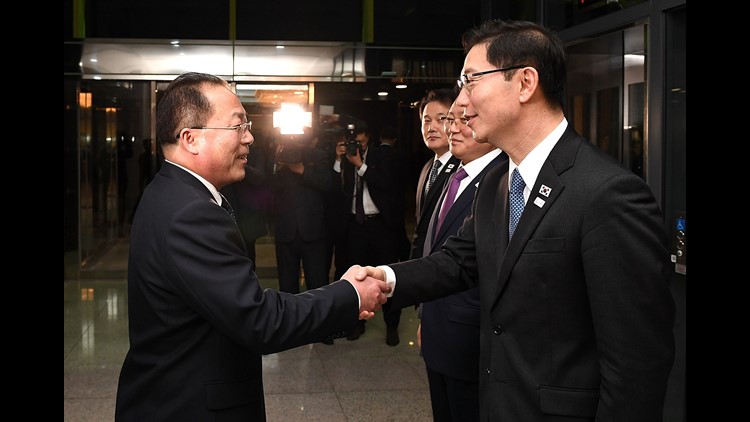North and South Korea agreed Wednesday to field a joint women’s hockey team at next month’s Winter Olympics and the two countries will march in to the opening ceremony under a single flag, according to South Korea’s Ministry of Unification.
The agreement came during a third round of talks between the rival Koreas at the border village of Panmunjom, located in the demilitarized zone that separates the peninsula.
It is the most striking breakthrough yet in a wave of sports diplomacy that began last week when the two countries sat down for the first time in over two years to discuss the North’s participation in the Winter Games.
Athletes from North and South Korea will march into the opening ceremony under the Unified Korea Flag, which features a blue silhouette of the Korean Peninsula against a white backdrop. The flag has been used before at international sporting events, including the 2006 Winter Games in Turin, Italy.
Players from North and South Korea will also field a single women’s hockey team, in a first for both countries. Korean officials are expected to discuss the moves at a meeting with the International Olympic Committee in Lausanne, Switzerland, slated for Saturday, according to the Ministry of Unification.
The North will send a large delegation to the Games, including a 230-member cheering squad and a 30-member taekwondo demonstration team. A 140-member orchestra from the North will also join the delegation, with performances scheduled for Seoul and Gangneung, a city hosting some Winter Games events.
The two countries also agreed to hold joint training for ski athletes at a ski resort in North Korea as well as hold a joint cultural event in the isolated nation. The North has proposed sending its delegation to the South across the land border between the two countries.
North Korea also plans to send a delegation to the Pyeongchang Paralympics, being held in March.
Talks came together after North Korean dictator Kim Jong Un sent an overture in his New Year’s Day address that the Olympics would be a “good occasion” to show the greatness of the Korean people and suggested that Pyongyang was willing to send a delegation to the Games.
South Korean President Moon Jae In has repeatedly stressed that he wants the Pyeongchang Olympics to be a means for re-engagement and conflict resolution with the North, calling the Games the “Peace Olympics.”
While engagement between the two Koreas is at its highest level in years, North Korea has held a hard line on certain issues. The South has been pushing to hold reunions for families that were separated by the Korean War, which ended in 1953. On Tuesday, however, reports emerged in South Korea’s Chosun Ilbo newspaper that Pyongyang demanded the return of a dozen North Korean defectors in the South as a condition for any reunions. South Korea is legally bound to refuse.
The North has also pushed for a permanent halt for joint military exercises held by the United States and South Korea, according to North Korean state-run media.
On Tuesday, Secretary of State Rex Tillerson said the situation with North Korea remained at a “tenuous stage” and warned that a military option may result if the country does not show a willingness to discuss denuclearization.
“We have to recognize that the threat is growing and if North Korea does not choose the pathway of engagement, discussion, negotiation, then they themselves will trigger an option,” Tillerson said. His remarks came at a Vancouver meeting of 20 nations seeking ways to increase pressure on North Korea.
At the event, Japanese Foreign Minister Taro Kono cautioned against being lulled by North Korea’s recent engagement with the South.
“We should not be naive about their intent,” he said. “Nor should we be blinded by North Korea’s charm offensive. In short, it is not the time to ease pressure or to reward North Korea.”
South Korean women’s hockey coach Sarah Murray told reporters Tuesday that she thought the proposed joint hockey team would affect team chemistry and create a difficult situation for her players, some of whom would presumably lose playing time to new players.
"It's hard because the players have earned their spots and they think they deserve to go to the Olympics,” she said, according to South Korea's Yonhap news agency. “Then you have people being added later. It definitely affects our players."



